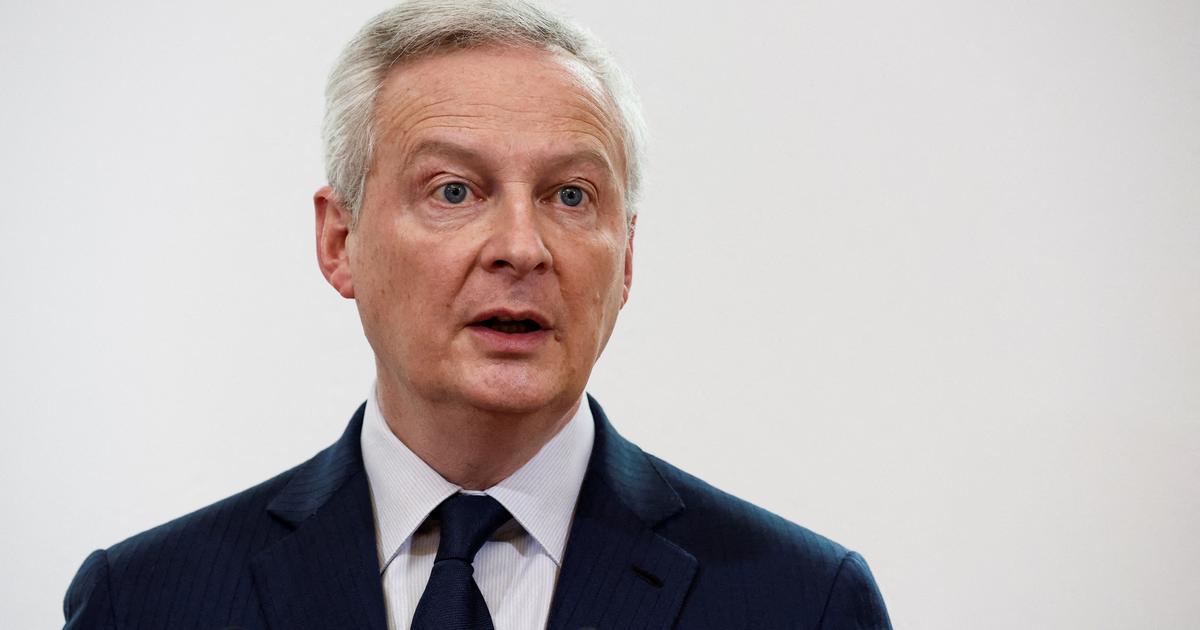Enlarge image
France's Finance Minister Le Maire: "We must not stifle growth"
Photo: Annegret Hilse / dpa / Reuters Pool
In the fight against the corona crisis, the debt rules in the EU were suspended in 2020 - and will remain so until the end of 2022. But what happens afterwards?
At a meeting in Slovenia, the finance ministers of the member states have now fiercely argued over the future permissible national debt.
France and other EU countries in particular are questioning the common rules.
The French finance minister Bruno Le Maire said in the Slovenian town of Kranj that some of the deficit targets were "obsolete".
Spain's Finance Minister Nadia Calviño spoke out in favor of “simplifying the rules and adapting them to reality”.
Le Maire justified the French stance with the billions spent by member countries in the corona pandemic.
"We mustn't stifle growth," he said.
At the same time, he showed himself to be open to exempting climate investments from the debt rules, because the fight against climate change required "a lot of money".
Scholz is in favor of stability
The so-called "thrifty" states want to prevent the Stability Pact from being undermined.
Austria, the Netherlands, Sweden and five other countries therefore sent a fire letter to the Council of Finance Ministers: "Reducing excessive debt" must remain a common goal, they demand in the letter from which the AFP news agency quotes.
New proposals should "not jeopardize the eurozone and the Union as a whole," argued the states.
The letter is also signed by Denmark, the Czech Republic, Slovakia, Finland and Latvia.
The critics of a debt policy that is too lax complain that otherwise green investments could be difficult to define.
Actually, there is an upper limit of three percent for new borrowing in relation to the economic strength of the country.
With the mountain of debt, the limit is 60 percent.
The differences within the EU are large, however, and in some cases the requirements have been exceeded significantly for years.
The rules of getting into debt
Open the debt brake area
"The budgets of the federal and state levels are basically to be balanced without income from loans," says Article 109 of the Basic Law.
In future, the federal states will no longer be allowed to incur any debts that are independent of the economy, while those of the federal government will be limited to 0.35 percent of gross domestic product.
Valid since
For the federal government since 2016, for the federal states from 2020.
Commitment
The debt brake has constitutional status.
In economic crises or emergencies such as a natural disaster, the debt can be higher.
But there must be a binding plan for the repayment of the loans.
Debt leeway for Germany (based on GDP 2018)
Around twelve billion euros for the federal government.
implementation
The federal government adhered to the debt brake until 2020.
Since then she has been suspended due to the corona crisis.
Expand Maastricht criteria area
Countries that want to adopt the euro must meet the convergence criteria of the Maastricht Treaty.
Accordingly, the new debt (deficit) may amount to a maximum of three percent and the total debt to a maximum of 60 percent of the gross domestic product.
The Stability and Growth Pact (SGP) means that these requirements must also be complied with after joining the euro.
Valid since
1993 (Maastricht Treaty) and 1999 (SWP).
Commitment
The Maastricht criteria are anchored in EU law, but have often been violated.
The EU Commission has therefore initiated numerous so-called deficit procedures, which, however, have not had any financial consequences.
Debt leeway for Germany (based on GDP 2018)
Almost 102 billion new debt and a good two trillion total debt.
implementation
Germany broke both rules early on.
Total debt fell below 60 percent in 2019 for the first time in 17 years, but exceeded this mark again significantly in the following year due to the corona crisis.
New borrowing was also well above the Maastricht hurdle in 2020 at just under five percent.
Because of the corona crisis, the EU suspended its deficit rules in the pandemic anyway.
Expand area of the Fiscal Compact
The fiscal pact was adopted as a tightening of the stability and growth pact after it was unable to prevent the European debt crisis.
Instead of just adhering to the three percent limit of the Maastricht criteria, the signatories of the fiscal pact should strive for balanced budgets in the medium term.
The state's indebtedness, which is independent of the economy, may not exceed 0.5 percent of the gross domestic product.
If the total debt is well below 60 percent, this limit increases to 1.0 percent.
Valid since
2013
Commitment
The signatory states must enshrine their goals in the constitution, as Germany did with the debt brake.
For the first time, the Fiscal Compact provides for the possibility of financial sanctions in the event of non-compliance.
So far, no use has been made of this option.
Debt leeway for Germany (based on GDP 2018)
Almost 17 billion, as long as the total debt is over 60 percent.
implementation
So far, Germany has complied with the debt rules of the Fiscal Compact.
They are currently suspended because of the corona crisis.
Area Black zero flaps
If government revenues and expenditures are the same, the bottom line is the proverbial black zero.
In this case, new debts are not necessary.
One also speaks of a balanced budget.
Valid since
-
Commitment
The black zero is not a legal requirement.
As a common goal of the Union and the SPD, however, it can be found in the current coalition agreement.
Debt leeway for Germany (based on GDP 2018)
None
implementation
In the federal government, the black zero was reached in 2014 for the first time in 45 years and held until 2020.
Then the state made new debts of around 130 billion euros because of the corona crisis.
According to a ZDF journalist, Federal Finance Minister Olaf Scholz has positioned himself against France's advance despite social democratic sympathies for a more debt-financed budget policy.
The SPD candidate for Chancellor said: "I think it's good that we in Europe have come to an agreement on stability criteria, (...) now it's about maintaining these rules."
According to the EU Commission, the 19 euro countries will have a budget gap of eight percent this year, compared to 7.2 percent in 2020.
The total debt should climb to 102.4 percent.
apr / AFP / Reuters








